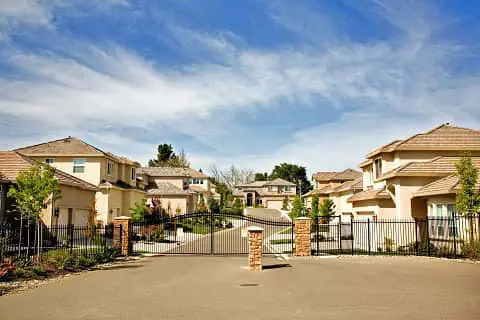
As a Realtor, you know gated communities are known for higher-priced homes, complete with more privacy, enhanced security, and an “exclusive” vibe.
Some homebuyers are looking specifically for homes in gated communities, but others have either never lived in one, or are curious about the benefits and downsides.
The point is to give your client the best options possible, whether or not a gated community is their cup of tea.
Marketing Behind the Gates
Selling a home in a gated community is different than selling one outside of one. The challenges are there in selling a new home in a gated community, and you have to get creative in your marketing tactics.
Some communities restrict “for sale” signs and open houses during certain hours. Instead of only relying on these traditional home selling avenues, draft some of the neighbors into the selling progress. Does anyone in the neighborhood know someone looking for a home?
Justin Moundas, a real estate agent with Douglas Elliman out of Nassau County in Long Island, NY, says for the most part, the homes he sells in gated communities do not have public open houses and are mostly sold by appointment only.
“Being in a gated community doesn’t necessarily make it harder to sell, but often these are higher priced homes,” said Moundas, “so the pool of prospective buyers are smaller than typical homes. “
Alternately, other Realtors, like Mary Goodwin of RE/MAX Associates in Colleyville, Texas, pass out brochures to gate guards so they can share them with prospective buyers who drive up to the neighborhood to sneak a peek at a house, but aren’t allowed in.
Another technique: phone calls.
“It’s a matter of calling prospects to explain to them that gated communities are an alternative to traditional housing,” said Goodwin. “I convert typical buyers by stressing the comfort and security of the lifestyle.”
Homeowners Associations
Many don’t like extensive control over the choices they make regarding their property, but unfortunately, living in a gated neighborhood comes with a homeowners association (HOA) that wants to make sure things run smoothly for everyone else in the community. This means rules, and for some neighborhoods, many rules.
A HOA can restrict what color buyers can paint their new homes and even dictate street parking after a certain hour. Some HOA’s require notice before any work may be done on to homes in the community. This may turn off to homebuyers looking for creative freedom.
Moundas says he obtains the community rules and regulations to ensure his client is comfortable with adhering to them, and has a clear understanding of what their dues do and don’t pay for.
Emphasize Security
It’s no secret that most homebuyers are looking at gated communities for privacy. As you know, there are a few different types of gated communities; some have a 24/7 gate guard, others have a code to punch in at the gate. This could be a huge positive or negative for your client, depending on how much privacy they like.
But some families may not like the idea of waiting outside the gate, or the longer commute to their neighborhood, as most gated communities are in the suburbs and further away from the city. So, in order to paint a full picture for your clients, do some research. For example, what methods does the neighborhood they are looking at have for access, how long does it take to get into the neighborhood, and how far is the neighborhood from your client’s workplaces?
Gated communities are more difficult to enter, thus residents are less likely to have unwanted visitors, criminal or otherwise. This is an important point to make to your client. Kids will be able to play around the neighborhood without rush hour traffic passing through, too.
For some, the benefits of a gated community will outweigh the negatives, and for others, it will seem like a no-brainer a gated neighborhood is not right for them. Utilizing the proper sales techniques, being transparent, and giving your homebuyer as much information possible about each neighborhood will help you find your client’s perfect new home and community.

